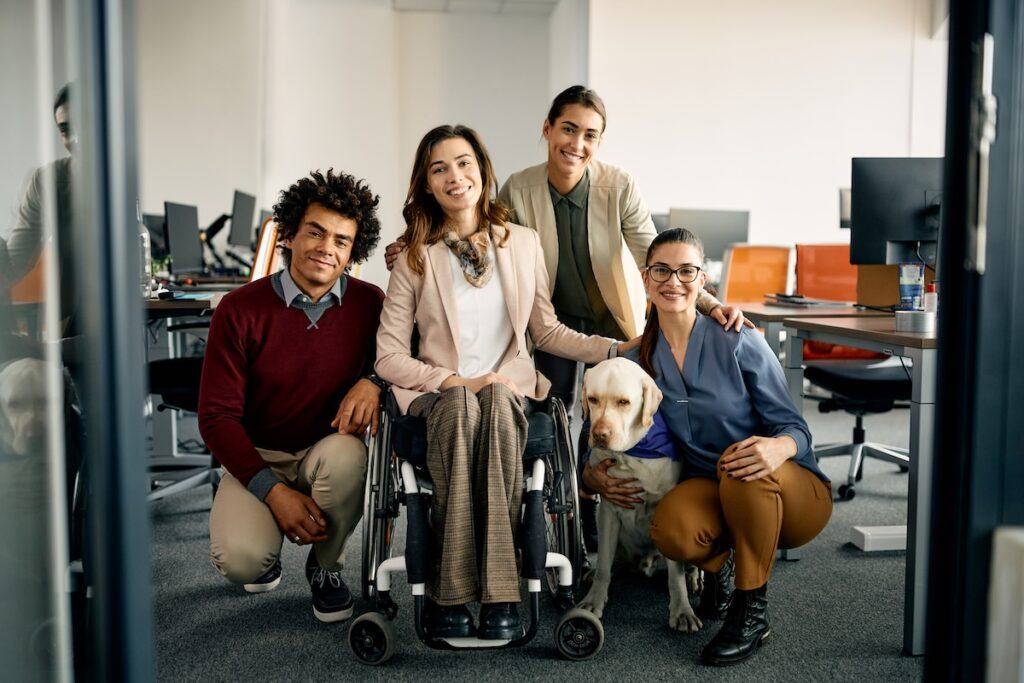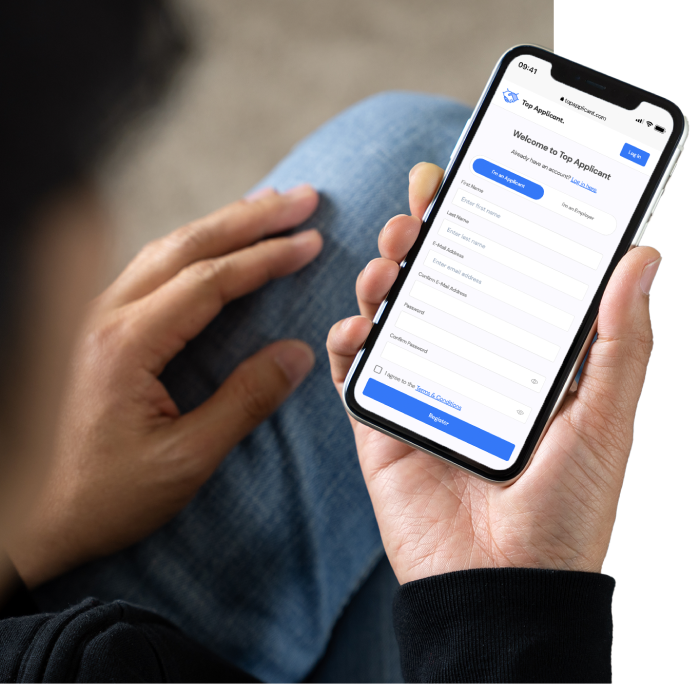
People with all abilities deserve a fulfilling career. So whether you’re looking for an inclusive workplace or you’re a considerate employer, Top Applicant is here for you. Our team of hiring experts is giving their insights about jobs for people with disabilities. To start, let’s take a look at what job seekers need to know about their careers. If you’re an employer, feel free to jump ahead!
For Employees
At Top Applicant, we believe in giving everyone a fair chance at a great career. No matter what your disability is, it shouldn’t define your success. Like many things in life, building your career can feel like climbing a mountain at first.
But with a modern push for inclusivity across all aspects of our society, those mountains are easier than ever to overcome. As we build our platform to provide the most modern hiring tools available, here’s how you can use them to find jobs for people with disabilities:
Where to Look
To get your career started or make your next move, you need to know where to look. Some of the top companies to apply for all have one thing in common: inclusivity. A great example of modern inclusivity is one of the most inclusive US-based companies, PepsiCo. So what makes their jobs for people with disabilities so desirable?
“Through inclusive practices such as offering ongoing sign language training, enhanced disability benefits, and self-identification, we are ensuring that our associates have the tools they need to achieve their maximum potential.”
PepsiCo Chairman and CEO Ramon Laguarta
PepsiCo is continually recognized as one of the most inclusive companies because of its groundbreaking initiatives. When deciding where to apply, do some digging into the company’s DEI policies to ensure you’re looking in the right place. Doing your homework about where you’ll work is just as important in finding jobs for people with disabilities and without. That’s why Top Applicant encourages companies to share their policies on every employer profile.

Wanna talk about it?
Above all else, our platform prioritizes professional communication on both sides of the hiring process. When it comes to disclosing your disability, you have nothing to fear with our tools. When it’s easier to show than type about your disability, we encourage applicants to hit record.
Our video-sharing capabilities make it possible for every applicant to share their story. However, you decide what and when you disclose your personal information. You are never required to provide details about your disability to an employer. Federally required ADA compliance laws, unless you require accommodations, do not force you to disclose any information about your disability.
Your Resources
In addition to the ADA, many other resources exist to help find jobs for people with disabilities. With state and federal backing, the resources we recommend are nationally known to employers and disability advocates. Here are a couple initiatives our experts recommend:
Job Accommodation Network
The Job Accommodation Network, or JAN, works to help those seeking jobs for people with disabilities navigate accommodations. JAN also provides practical, proven suggestions for negotiating accommodations with your future employer. To learn more about your potential accommodations, head to the JAN website!
Schedule A
Schedule A is a federal hiring authority designed to help find government jobs for people with disabilities. This serves as an exception to the traditional hiring process for select federal positions. Schedule A works to streamline the hiring process for applicants with a disability. In some cases, officials may hire solely from a pool of qualified people who’ve applied through Schedule A. You can learn more about Schedule A with this helpful guide from the EEOC!
Top Applicant’s Top 3 Jobs
Now that you know where to look and how to get hired, you’re probably wondering what our favorite jobs for people with disabilities are! Our top 3 jobs all have inclusivity, mobility, and your success in mind. So without further ado, here are our top three recommendations for you!
3. Office Administration
Our first recommendation is for those with mental or learning disabilities. Crucial positions, such as receptionists or data entry, require repetitive, structured work every day. As you get the basics down, you can quickly build a competitive resume that gets seen before your disability! Room for growth and a broad market are why these are some of our favorite jobs for people with disabilities.
2. Marketing Professionals
With modern technology, more possibilities are available than ever to those with hearing and visual disabilities. Some of our favorite jobs for people with disabilities are in the marketing field, such as copywriting, management, and more! The room for growth and vast opportunities make marketing one of our favorite fields for job seekers with disabilities.
1. IT Professionals
The world of information technology is evolving every day. These are especially great jobs for people with physical disabilities who may feel limited by where they work or what they can do. Our favorite part of this field is that you don’t have to be a computer genius to get started either! Read our related article to get your career started.
Related: How to Get Into IT
Never Settle
Your disability shouldn’t define your success. That’s why Top Applicant is proud to be the modern hiring platform for job seekers of all backgrounds and abilities. To build your career, whether that’s part-time or full-time, you can log in, build your profile, and discover your ideal employer all in one place!
For Employers
Top Applicant is committed to being a resource for modern employers and employees equally. That’s why our hiring experts tackle hard subjects like providing jobs for people with disabilities. We’ve done our homework so you don’t have to. Here’s why and how employers can open up their full-time and part-time positions to people of all abilities:
Keep It Legal
First things first, your HR and legal departments will have fewer headaches as you learn more about what Uncle Sam has to say surrounding inclusive hiring. Here’s what you need to know about your future employees’ federal rights.

The Americans with Disabilities Act (ADA)
This cornerstone of employment equity prohibits discrimination against people with disabilities. It also guarantees equal opportunities for individuals with disabilities in employment, transportation, public accommodations, state and local government services, and telecommunications. Two key aspects of this act pertain directly to the hiring process and employee rights regarding jobs for people with disabilities.
Title I: Employment
This prohibits covered employers from discriminating against people with disabilities in all employment-related activities. This includes hiring, pay, benefits, firing, and promotions. Employers covered under this title include private businesses, educational institutions, employment agencies, labor organizations, and state/local government entities with 15+ employees.
Title II: State and Local Governments
This title protects people with disabilities from discrimination in government positions. These include state and local services, programs, and activities. It also prohibits all state and local government entities from discriminating against qualified individuals with disabilities in employment regardless of how many people they employ or whether they receive federal financial assistance.
Getting familiar with the ADA is a great start to understanding how to keep your hiring fair and legal. But there is so much more to understand when it comes to providing jobs for people with disabilities. To familiarize yourself further with federal regulations, consult the ODEP to learn about employment laws that pertain to your business.
DEI Dos and Don’ts
As you learn more about the rules and regulations surrounding employees with disabilities, it’s also important to know why more employers are going above and beyond these regulations. Diversity, equity, and inclusion are important across all aspects of every industry. Everyone deserves a fair chance at a great career, and your business deserves the best employees.
Need some inspiration? Top Applicant recommends looking to CVS Health as a great example of DEI when it comes to providing jobs for people with disabilities.
Abilities in Abundance
CVS Health’s Abilities in Abundance offers highly successful skills development programs, job training, and placement opportunities for driven participants facing intellectual, developmental, and visual disabilities. Through their continuous commitment to their community, CVS Health enjoys less turnover in key positions, lower costs associated with training, and a boost in brand loyalty.
This initiative helps employees hired through this program build the knowledge and skills necessary for a successful, fulfilling career. The runaway success of this initiative has helped CVS Health attract a large portion of its market that values the representation of people with disabilities.
From this example, it’s not hard to see why effective DEI practices can help your organization. By providing good jobs for people with disabilities, companies are not only providing opportunities, they’re also capitalizing on a great boost for brand loyalty! Here are the dos and don’ts for DEI when hiring disabled individuals:
Don’t:
Directly Ask About Disabilities
Under the ADA, employers are not allowed to directly ask about the details or causes of a candidate’s disability. This act also ensures that any reasonable accommodations can be made by an employer to ensure fair and equitable hiring.
If a candidate directly discloses their disability, an employer can ask about the required accommodations. However, we suggest avoiding that conversation altogether so you have more time to focus on a candidate’s qualifications instead of their disabilities.
Overlook Qualified Applicants
On Top Applicant, we prioritize open and honest communication. So if your ideal candidate may openly display a disability, don’t overlook them! You never know who will be your next success story, so regardless of an applicant’s abilities, every qualified applicant deserves a fair chance.
Neglect Your Workplace
Diversity, equity, and inclusion don’t just apply to the hiring process! Every business should grow and change with the people it employs. So as your workforce evolves, make sure your physical workplace is just as inclusive. This includes providing accessible bathroom facilities, ADA-compliant railing, correct doors, and much, much more.
Do:
Provide Accommodations
One of the simplest ways to provide equitable jobs for people with disabilities is to provide reasonable accommodations. With modern accessibility tools and resources, it’s easier than ever before for employers to open up daily tasks to people of all abilities.
Common accommodations can include service animals, assistive technologies, accessibility services, and more. If you’re unsure where to start, the Job Accommodation Network is a great way to learn how to implement common accommodations without making confusing policy changes. Take a look at their handy toolkit to improve your inclusivity!
Prioritize Understanding
How well do you know your industry? You may be the go-to manager for your department now, but everyone has to start somewhere. Think back to the earliest days of your career. How much did you have to rely on sights, sounds, and mobility to learn the ropes? Now imagine if you had to start your career with a physical or mental disability.
While there may be great resources available to help graduate and learn a skill, launching a career with a disability can still be extremely difficult. That’s why building an understanding of what someone may be going through is essential to providing equitable access to jobs for people with disabilities. To improve your company’s careers for students with disabilities after graduation, we recommend this roadmap from the National Organization on Disability.
Advocate for Equity
By improving your understanding and increasing your aptitude for accommodations, you’ll not only grow your company, you’ll become a resource for others to do the same! To help other companies learn the benefits of inclusive employment, we recommend talking about it.
Talk to local and state organizations about your initiatives, and share your progress with other employers. The reason Top Applicant can share so many insights surrounding jobs for people with disabilities is that companies continue to advocate for them! Improving the modern hiring process starts with you. So what are you waiting for?

There’s a Job for Everyone
Top Applicant is here to make modern hiring tools accessible to everyone. From video sharing capabilities to personalized matchmaking, our platform is at the forefront of the next HR revolution. Put the human back in your human resources department by promoting jobs for people with disabilities and posting your positions in just a few clicks!
There’s an ad for Everyone
While we’re proud to provide free career building resources for everyone, the hours of research and development we spend to provide them don’t come cheap! To keep the resources rolling and get your business out there, consider advertising with us!


